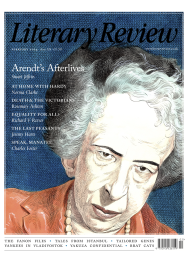Lucy Popescu
Freddy Quezada
Nicaragua is in the international spotlight following a governmental crackdown on the Catholic Church. In recent years, president Daniel Ortega and his wife, Rosario Murillo, who is the country’s vice-president, have targeted clerics for speaking out against their rule. On 10 February 2023, Rolando Alvarez, a prominent Catholic bishop, was sentenced to twenty-six years in prison for ‘undermining national integrity’ and ‘propagating fake news’ after criticising Ortega and the government. Last month, he was expelled to the Vatican, together with eighteen other clergymen, including a bishop, Isidoro Mora, and fifteen priests. Mora had been detained by police after telling his congregation that Nicaragua’s bishops were ‘united in prayer’ for Alvarez.
Less well known is the arbitrary detention of 65-year-old writer and academic Freddy Quezada, who has taught generations of Nicaraguan journalists and sociologists and actively promotes critical thinking. Quezada was arrested at his home on 30 November 2023. His family were not made aware of his whereabouts until five days later. On 5 December, Quezada was transferred to the Jorge Navarro Penitentiary System in Tipitapa, without being informed of the reasons for his detention and without access to legal representation. His family have received no official confirmation of his detention and, at the time of writing, Quezada’s status and the charges against him are unknown.
Quezada was arrested hours after posting messages on social media, under the pseudonym Uliteo, that were deemed to be critical of the Nicaraguan government. In one of his last posts before he was detained, Quezada referred to the government as a ‘dictatorship’ and criticised the public narrative around the detention of Alvarez.
Ortega, the son of a shoemaker, joined Nicaragua’s left-wing Sandinista National Liberation Front as a teenager. The group opposed the dictatorship of Anastasio Somoza, whose family had ruled the country since 1936. In the 1960s, Ortega dropped out of his law studies. When he was twenty-one, he took part in an armed robbery of a branch of Bank of America in the capital, Managua, in a bid to raise funds. He was arrested and endured severe torture during his seven years in prison.
In 1974, after securing early release, Ortega was sent to Cuba. He trained there in guerrilla warfare before returning to his homeland. In 1979, Ortega married Murillo, a poet he had met while in prison. The same year, the Sandinistas took power, forcing Somoza into exile. Ortega served on the Sandinistas’ ‘national reconstruction’ board and was elected as president in 1984. He was ousted in 1990 but returned to power in 2007. In 2021 he was sworn in for his fourth consecutive term as president and is now the longest-serving leader in the Americas. His opponents believe that he has become a corrupt and authoritarian ruler, having turned his back on his revolutionary ideals, and that he has come to resemble the dictator he deposed.
On 18 April 2018, people took to the streets to protest peacefully against reforms to the social security system. According to Amnesty, the authorities responded with brutal repression, leaving more than three hundred people dead and over two thousand injured, and detaining hundreds arbitrarily. Clerics reportedly sheltered students in churches as mass anti-government protests swept through the country. Quezada was dismissed from his academic role at the National Autonomous University of Nicaragua after criticising the regime’s violent repression of students involved in the protests.
Since then, the government has closed many media outlets, while human rights activists and journalists are regularly subjected to death threats, surveillance, online defamation campaigns and other forms of intimidation. Several have fled the country. In August last year, journalist Victor Ticay was sentenced to eight years in prison on charges of undermining national integrity and disseminating false news. PEN has condemned the ongoing censorship in Nicaragua and is calling on the authorities to end the persecution and arbitrary detention of journalists, writers and academics critical of the government. Quezada’s arrest is ‘yet another example of how Daniel Ortega has created a climate of near-total censorship and silencing of a country’, said Ma Thida, chair of the Writers in Prison Committee of PEN International.
Readers might like to send appeals to the Nicaraguan embassy in London calling for the immediate release of Freddy Quezada, seeking assurances that while in prison Quezeda will receive regular access to legal representatives, medical care and his relatives, and urging the authorities to give Quezada’s family information about his whereabouts and condition.
Appeals to be addressed to:
His Excellency Carlos Arguello Gomez
Nicaraguan Embassy
Vicarage House
58–60 Kensington Church Street
London W8 4DB
Fax: +44 20 7937 0952
Email: embaniclondon@btconnect.com

Sign Up to our newsletter
Receive free articles, highlights from the archive, news, details of prizes, and much more.@Lit_Review
Follow Literary Review on Twitter
Twitter Feed
Alfred, Lord Tennyson is practically a byword for old-fashioned Victorian grandeur, rarely pictured without a cravat and a serious beard.
Seamus Perry tries to picture him as a younger man.
Seamus Perry - Before the Beard
Seamus Perry: Before the Beard - The Boundless Deep: Young Tennyson, Science, and the Crisis of Belief by Richard Holmes
literaryreview.co.uk
Novelist Muriel Spark had a tongue that could produce both sugar and poison. It’s no surprise, then, that her letters make for a brilliant read.
@claire_harman considers some of the most entertaining.
Claire Harman - Fighting Words
Claire Harman: Fighting Words - The Letters of Muriel Spark, Volume 1: 1944-1963 by Dan Gunn
literaryreview.co.uk
Of all the articles I’ve published in recent years, this is *by far* my favourite.
✍️ On childhood, memory, and the sea - for @Lit_Review :
https://literaryreview.co.uk/flotsam-and-jetsam